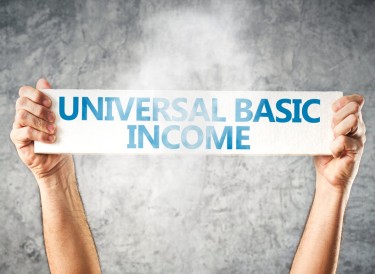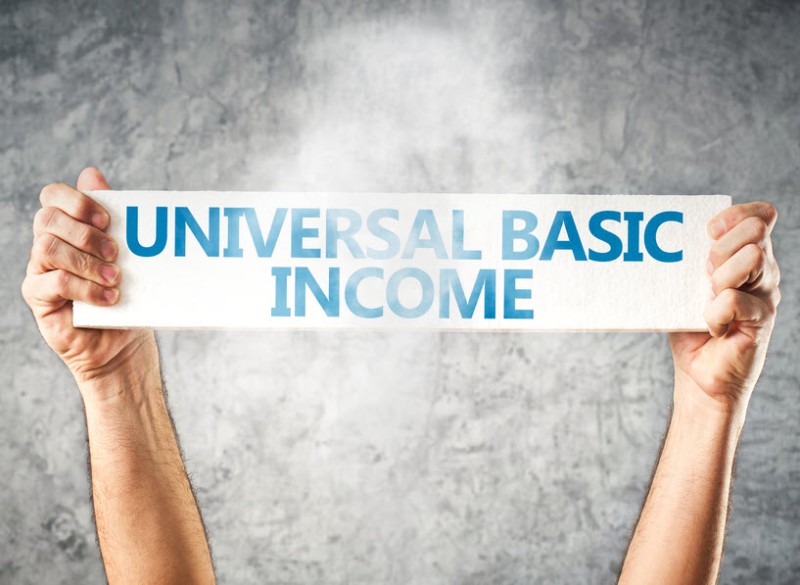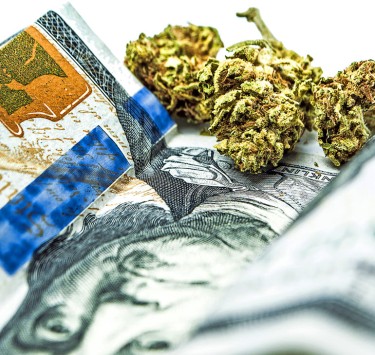
While Texas lawmakers are busy criminalizing adults for THC possession and gift-wrapping an $8 billion market for drug cartels, New Mexico is taking a radically different approach. The Land of Enchantment has discovered something remarkable: cannabis tax revenue can do more than just fill government coffers—it can directly transform lives through Universal Basic Income.
In a groundbreaking pilot program, New Mexico is using cannabis tax revenue to provide no-strings-attached cash payments to residents, creating what may be the most innovative social welfare program in the United States. This isn't theoretical policy experimentation—it's a real program delivering real results to real people who need financial support the most.
The contrast couldn't be starker. While one state criminalizes cannabis and ensures all revenue flows to criminal organizations, another state has legalized, regulated, and channeled that same revenue stream into direct poverty alleviation. The message is clear: cannabis isn't just about personal freedom or medical access—it's about social justice and economic opportunity.
This pilot program represents everything prohibition opponents have argued for decades: that cannabis legalization creates positive social outcomes that extend far beyond the immediate users. When properly regulated and taxed, cannabis becomes a tool for addressing inequality, funding social programs, and demonstrating that evidence-based policy works better than moral panic.
As we examine New Mexico's innovative approach, the question becomes not whether other states should follow suit, but whether they can afford not to. While prohibitionist states continue pouring resources into failed enforcement and incarceration, legalization states are using cannabis revenue to build more equitable societies.
The New Mexico Model: How Cannabis Funds Universal Basic Income
New Mexico's cannabis-funded Universal Basic Income pilot program represents one of the most innovative uses of marijuana tax revenue in the country. Unlike traditional welfare programs with complex eligibility requirements and bureaucratic hurdles, this initiative provides direct cash payments to residents with minimal restrictions—funded entirely by cannabis tax revenue.
The program emerged from New Mexico's broader cannabis legalization framework, which took effect in 2021. Rather than simply dumping cannabis tax revenue into general funds where it might disappear into the bureaucratic maze, state leaders recognized an opportunity to create targeted social impact. The UBI pilot specifically uses a portion of cannabis excise taxes to provide monthly payments to qualifying residents, creating a direct link between cannabis commerce and poverty alleviation.
Recipients receive monthly cash payments that they can use for any purpose—rent, groceries, childcare, transportation, or any other expense. This approach differs fundamentally from traditional welfare programs that restrict how benefits can be used. The philosophy underlying UBI is that people understand their own needs better than government bureaucrats and should have the freedom to allocate resources accordingly.
Early results from the program have been encouraging. Recipients report using the payments for basic necessities like housing and food, but also for opportunities that traditional welfare might not cover—things like car repairs that enable work, childcare that allows job searching, or small investments in education or skills training. The unrestricted nature of the payments provides flexibility that targeted welfare programs often lack.
The funding mechanism creates a virtuous cycle: legal cannabis sales generate tax revenue, which funds direct cash assistance, which stimulates local economic activity, which generates additional tax revenue. This stands in stark contrast to prohibition, which generates no tax revenue while consuming vast resources for enforcement and incarceration.
New Mexico's approach also demonstrates how cannabis legalization can address social equity concerns that extend beyond expunging criminal records. By directing cannabis revenue toward UBI, the state creates ongoing benefits for communities that were disproportionately impacted by prohibition. Rather than just ending the harm of criminalization, cannabis legalization becomes a tool for actively improving economic conditions.
The program's simplicity is part of its genius. Rather than creating new bureaucracies or complex eligibility systems, it leverages existing infrastructure to distribute payments efficiently. This reduces administrative costs and ensures more money reaches recipients rather than being consumed by overhead.
Critics of UBI often argue that direct cash payments reduce work incentives, but early data from New Mexico suggests otherwise. Many recipients use the financial stability provided by UBI to pursue education, training, or job searches that might otherwise be impossible when living paycheck to paycheck. The payments provide a foundation that enables rather than discourages productive activity.
Who Benefits: The Human Impact of Cannabis-Funded UBI
The beneficiaries of New Mexico's cannabis-funded UBI program represent a cross-section of Americans struggling with economic insecurity in an increasingly expensive world. Unlike stereotype-driven narratives about welfare recipients, the actual participants in this program demonstrate the broad reach of financial instability in modern America.
Single mothers comprise a significant portion of recipients, using the monthly payments to cover childcare costs that often make working financially impossible. Traditional welfare systems create cliff effects where earning slightly more income results in massive benefit losses, trapping recipients in poverty. UBI eliminates these perverse incentives by providing consistent support regardless of other income.
College students represent another major beneficiary group. With student loan debt reaching crisis levels and the cost of education continuing to climb, many students struggle to balance work and study commitments. The UBI payments provide financial stability that allows students to focus on education rather than working multiple jobs to survive. This investment in human capital generates long-term economic returns that far exceed the initial cost.
Veterans, particularly those transitioning from military to civilian life, have found the program invaluable. The monthly payments provide stability during job searches and help cover costs associated with relocation, training, or starting small businesses. For veterans dealing with PTSD or other service-related conditions, the financial security reduces stress that can exacerbate mental health challenges.
Gig economy workers—drivers, freelancers, contractors—use UBI to smooth income volatility that characterizes modern employment. Rather than facing financial crisis during slow periods, they have a foundation of support that enables them to be more selective about opportunities and invest in equipment or training that improves earning potential.
Rural residents facing economic transitions as traditional industries decline find UBI particularly valuable. Mining, ranching, and manufacturing communities throughout New Mexico have experienced job losses as economic conditions change. The cannabis-funded payments provide support during retraining periods and help maintain rural communities that might otherwise face population exodus.
Perhaps most importantly, the program serves working families—people who are employed but still struggle with basic expenses due to low wages and high costs. These individuals often don't qualify for traditional welfare but still face genuine financial hardship. UBI fills this gap by providing support without the stigma or bureaucratic complexity of traditional programs.
The psychological benefits extend beyond pure economics. Recipients report reduced stress, improved mental health, and greater ability to plan for the future. The predictable nature of UBI payments provides emotional stability that irregular income or complex welfare systems cannot match. This psychological foundation enables better decision-making and long-term planning.
Children benefit indirectly but significantly. Families receiving UBI report being able to provide better nutrition, stable housing, and educational opportunities for their children. The intergenerational effects of childhood poverty are well-documented; breaking these cycles through family financial stability generates enormous long-term social benefits.
Scaling the Model: Cannabis-Funded Social Programs Nationwide
New Mexico's success with cannabis-funded UBI demonstrates a scalable model that other states could adapt to their specific needs and priorities. The fundamental concept—using cannabis tax revenue for direct social benefit programs—can be implemented in various forms depending on local conditions and political preferences.
States considering cannabis legalization should examine New Mexico's approach as a template for addressing social equity concerns while generating public support for reform. Rather than simply arguing for legalization based on individual liberty or criminal justice reform, advocates can point to concrete social benefits that appeal to broader constituencies.
The economic scale of potential nationwide implementation is staggering. Cannabis sales in legal states already generate billions in tax revenue annually. If even a portion of this revenue were dedicated to UBI or similar programs, it could provide meaningful financial support to millions of Americans while demonstrating the positive social outcomes of evidence-based drug policy.
Different states might adapt the model to their specific priorities. Rural states might focus on supporting agricultural communities transitioning from traditional crops. Urban states might emphasize programs addressing homelessness or supporting small business development. The flexibility of UBI allows states to address their unique challenges while maintaining the program's essential characteristics.
Implementation could be phased to build public support and refine administrative systems. Starting with targeted populations—veterans, students, or specific geographic areas—allows states to demonstrate effectiveness before expanding to broader eligibility. This approach reduces political risk while generating evidence for program expansion.
Interstate cooperation could enhance effectiveness. States with similar demographics or economic challenges could share best practices, coordinate program designs, or even create regional UBI systems. This collaboration could reduce administrative costs while increasing program impact.
Federal policy could support state-level innovation through tax incentives, grants, or regulatory flexibility. While federal UBI remains politically challenging, supporting state experimentation with cannabis-funded programs could generate evidence for broader policy discussions.
The model also addresses concerns about cannabis legalization by demonstrating concrete social benefits that extend beyond individual users. Critics often argue that legalization primarily benefits cannabis companies and users, but cannabis-funded UBI shows how the entire community can benefit from well-designed legalization policies.
From Prohibition to Progress: A Tale of Two Approaches
The contrast between Texas and New Mexico illuminates two fundamentally different approaches to cannabis policy and their dramatically different outcomes. While Texas criminalizes adults and empowers cartels, New Mexico generates tax revenue and funds poverty alleviation. The policy choices couldn't be more different, and neither could the results.
Texas Senate Bill 3 will destroy an $8 billion legal industry, eliminate thousands of jobs, reduce tax revenue, increase incarceration costs, and hand market control to criminal organizations. The human cost includes veterans losing access to alternatives to addictive opioids, patients losing medical options, and adults facing criminal penalties for personal choices that harm no one else.
Meanwhile, New Mexico's approach generates tax revenue, creates legitimate jobs, reduces criminal market share, and funds programs that directly improve lives. The same plant that Texas treats as a criminal threat becomes a tool for social progress in New Mexico.
The economic implications extend beyond direct program costs. Texas will spend millions prosecuting THC cases, incarcerating offenders, and dealing with the social costs of criminalization. New Mexico generates revenue while reducing criminal justice costs and investing in human capital through UBI.
The message to other states is clear: prohibition is expensive and ineffective, while regulation generates resources for addressing social challenges. States choosing the Texas model will waste resources on failed enforcement while missing opportunities to fund programs their residents desperately need.
New Mexico's success demonstrates that cannabis legalization isn't just about ending prohibition—it's about creating positive alternatives that serve the public interest. Cannabis-funded UBI transforms the debate from arguments about individual liberty to demonstrations of community benefit.
The Sticky Bottom Line
New Mexico's cannabis-funded Universal Basic Income program represents more than innovative policy—it's proof that cannabis can be a force for social good when approached with wisdom rather than prohibition-era paranoia. While other states waste resources criminalizing adults and empowering cartels, New Mexico has discovered how to transform cannabis commerce into direct poverty alleviation.
The contrast with prohibitionist approaches like Texas Senate Bill 3 couldn't be starker. One state criminalizes, incarcerates, and impoverishes while the other regulates, generates revenue, and supports those in need. The choice between these approaches isn't just about cannabis policy—it's about what kind of society we want to build.
The success of New Mexico's program should inspire other states to reconsider their approach to cannabis. Rather than viewing marijuana as a threat to be eliminated, states can recognize it as an opportunity to address social challenges while respecting individual liberty. Cannabis-funded UBI demonstrates that evidence-based policy creates better outcomes than moral panic legislation.
For cannabis reform advocates, New Mexico provides a powerful argument for legalization that extends beyond personal freedom or criminal justice reform. Cannabis becomes a tool for addressing inequality, supporting vulnerable populations, and demonstrating that progressive policy works. This broader appeal could help build coalitions that include social justice advocates, anti-poverty organizations, and fiscal conservatives interested in efficient program delivery.
The program also addresses one of the strongest arguments against UBI—the question of funding. By linking UBI to cannabis tax revenue, New Mexico creates a sustainable funding source while avoiding the political challenges of raising traditional taxes. This model could make UBI politically viable in states where broader tax increases would face opposition.
As more states consider cannabis legalization, they should examine New Mexico's approach as a template for maximizing social benefit while building public support. Cannabis-funded social programs demonstrate that legalization creates opportunities for positive change that extend far beyond the immediate users.
The fundamental lesson is simple: prohibition wastes resources on failed enforcement while missing opportunities to address real social challenges. Regulation generates revenue that can fund programs serving the public interest. The choice between these approaches reflects deeper questions about the role of government and the kind of society we want to create.
New Mexico has shown that cannabis can fund universal basic income, support vulnerable populations, and demonstrate the power of evidence-based policy. Other states can learn from this example or continue wasting resources on prohibition policies that consistently fail to achieve their stated goals.
The future of cannabis policy isn't just about ending prohibition—it's about building something better in its place. New Mexico's cannabis-funded UBI program points toward that better future, where policy serves human needs rather than ideological preferences. As more states face the choice between prohibition and progress, New Mexico's example shows which path leads to genuine social benefit.






